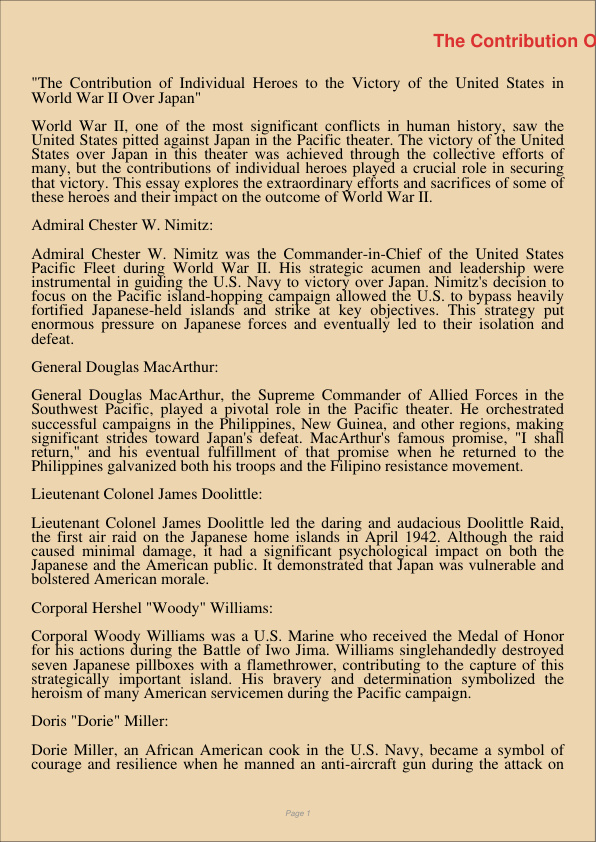“The Contribution of Individual Heroes to the Victory of the United States in World War II Over Japan”
World War II, one of the most significant conflicts in human history, saw the United States pitted against Japan in the Pacific theater. The victory of the United States over Japan in this theater was achieved through the collective efforts of many, but the contributions of individual heroes played a crucial role in securing that victory. This essay explores the extraordinary efforts and sacrifices of some of these heroes and their impact on the outcome of World War II.
Admiral Chester W. Nimitz:
Admiral Chester W. Nimitz was the Commander-in-Chief of the United States Pacific Fleet during World War II. His strategic acumen and leadership were instrumental in guiding the U.S. Navy to victory over Japan. Nimitz’s decision to focus on the Pacific island-hopping campaign allowed the U.S. to bypass heavily fortified Japanese-held islands and strike at key objectives. This strategy put enormous pressure on Japanese forces and eventually led to their isolation and defeat.
General Douglas MacArthur:
General Douglas MacArthur, the Supreme Commander of Allied Forces in the Southwest Pacific, played a pivotal role in the Pacific theater. He orchestrated successful campaigns in the Philippines, New Guinea, and other regions, making significant strides toward Japan’s defeat. MacArthur’s famous promise, “I shall return,” and his eventual fulfillment of that promise when he returned to the Philippines galvanized both his troops and the Filipino resistance movement.
Lieutenant Colonel James Doolittle:
Lieutenant Colonel James Doolittle led the daring and audacious Doolittle Raid, the first air raid on the Japanese home islands in April 1942. Although the raid caused minimal damage, it had a significant psychological impact on both the Japanese and the American public. It demonstrated that Japan was vulnerable and bolstered American morale.
Corporal Hershel “Woody” Williams:
Corporal Woody Williams was a U.S. Marine who received the Medal of Honor for his actions during the Battle of Iwo Jima. Williams singlehandedly destroyed seven Japanese pillboxes with a flamethrower, contributing to the capture of this strategically important island. His bravery and determination symbolized the heroism of many American servicemen during the Pacific campaign.
Doris “Dorie” Miller:
Dorie Miller, an African American cook in the U.S. Navy, became a symbol of courage and resilience when he manned an anti-aircraft gun during the attack on Pearl Harbor, despite having no formal training as a gunner. His actions underscored the valor of individual servicemen and challenged racial prejudices at the time.
The Navajo Code Talkers:
The Navajo Code Talkers, a group of Native Americans who served as radiomen in the Marine Corps, developed an unbreakable code based on the Navajo language. Their code played a vital role in securing communications and ensuring that the Japanese could not intercept or decipher important messages.
Conclusion:
The victory of the United States over Japan in World War II was the result of countless heroic and selfless acts by individual men and women who put their lives on the line for the greater good. While these are just a few examples, they represent the broader spirit of heroism that defined the conflict. The sacrifices and contributions of these heroes, along with countless others, not only played a critical role in securing victory in the Pacific but also serve as enduring examples of the indomitable spirit and determination of those who fought for the cause of freedom during World War II. Their legacies continue to inspire generations to come.

「真诚赞赏,手留余香」
真诚赞赏,手留余香
使用微信扫描二维码完成支付
